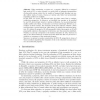1020 search results - page 65 / 204 » Tight Semantics for Logic Programs |
137
Voted
LOGCOM
2010
14 years 9 months ago
2010
When monitoring a system wrt. a property defined in a temporal logic such as LTL, a major concern is to settle with an adequate interpretation of observable system events; that is,...
147
Voted
ASP
2005
Springer
15 years 8 months ago
2005
Springer
Possibilistic Stable model Semantics is an extension of Stable Model Semantics that allows to merge uncertain and non monotonic reasoning into a unique framework. To achieve this a...
127
click to vote
SIGCSE
2002
ACM
15 years 2 months ago
2002
ACM
In our approach to the Programming Languages course, formal models are integrated as a thread that pervades the course, rather than as a one of many topics that is introduced and ...
115
Voted
PLILP
1995
Springer
15 years 6 months ago
1995
Springer
We use Girard's linear logic (LL) to produce a semantics for Gamma, a multiset transformation language. The semantics improves on the existing structured operational semantics...
114
click to vote
ML
2006
ACM
15 years 2 months ago
2006
ACM
In this paper, we describe the syntax and semantics for a probabilistic relational language (PRL). PRL is a recasting of recent work in Probabilistic Relational Models (PRMs) into ...

